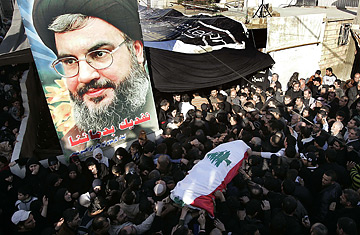
Mourners carry the coffin of Adnan Shams, 25, past a poster of Hezbollah leader Sheik Hassan Nasrallah. Shams was killed during last week's clashes between government and opposition forces.
Last week the Lebanese army failed to stop Hizballah from closing down Beirut and much of the rest of Lebanon. The Shi'ite organization made sure everyone knows it can take Beirut, historically a Sunni city, whenever it wants. The rioting that followed will be to Hizballah's benefit, since it thrives on chaos.
And that hasn't been the only recent improvement in Hizballah's fortunes. A couple of weeks ago, the Israeli chief of staff was forced to retire, which many regard as an Israeli acknowledgement that it lost last summer's 34-day war with Hizballah. Most Lebanese Shi'a apparently agree. According to a Zogby poll, 70% of Lebanese Shi'a believe the Israelis were the losers in the war. Almost 70% said they have a more positive view of Hizballah than they did before the conflict.
I asked a Lebanese Shi'a politician what Hizballah intends to do with its newfound power. "Nothing," he said. "Hizballah is already the de facto Lebanese government. It's only a matter of time before the government falls, Hizballah fills its shoes, and becomes the defender of the status quo."
This is very scary stuff. Most of Hizballah's leadership, including its secretary general Hasan Nasrallah, began their political lives as Iranian agents. They have American blood on their hands, including blowing up the U.S. Embassy in Beirut and the Marines' barracks in 1983 — the world's bloodiest terrorist attacks until 9/11.
Today Hizballah will tell you this is all ancient history, a chapter in Lebanon's civil war best forgotten. Autres temps, autres moeurs. They will point out that during last summer's war Hizballah didn't touch a hair of a single American, even though the United States was fully behind the retaliatory Israeli bombardment of Hizballah. (The fact that Hizballah didn't kidnap or kill Americans is a distinction without a difference for Israeli civilians killed by Hizballah Katushka rockets.)
The past aside, I asked my Shi'a friend what's keeping Hizballah from immediately taking power. "The Sunni," he said. "If Hizballah moves too fast, the Sunni push the country into a full-fledged civil war."
He and a couple of other Shi'a friends forwarded me texts of sermons from Sunni mosques, which indeed were hair-raising. The Sunni prayer leaders call the Shi'a apostates, a Jewish conspiracy inside Islam, one that must be rooted out — by blood.
There is nothing but two equally bad outcomes here. Hizballah takes over, creating an Iranian-allied Shi'a state, and Lebanon becomes a template for resurgent Shi'a throughout the Gulf. And certainly another war with Israel. Or, two, a civil war on par with Iraq's. In either case, fasten your seatbelts.
Robert Baer, a former CIA field officer assigned to the Middle East, is the author of See No Evil and, most recently, the novel Blow the House Down.
